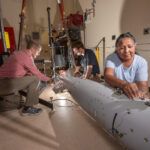The false promise of missile defense
By Pavel Podvig | September 14, 2009
Of the many security quagmires confronting President Barack Obama, perhaps the most challenging is how he navigates the Bush administration’s decision to place missile defense installations in Eastern Europe. As a candidate, Obama didn’t rule out keeping the Bush plan to put a missile defense radar in the Czech Republic and interceptors in Poland, but he did place the onus on the technology–i.e., it had to be viable. True to his campaign promise, upon taking office, he ordered a review of the program, which is about to be completed.
Missile defense will never make a shred of difference when it comes to its primary mission–protecting a country from the threat of a nuclear missile attack.”
No matter how critical the report is–and most expect it to be highly skeptical of the Bush plan–it won’t be easy for Obama to reverse course on European missile defense. Poland and the Czech Republic would hate to see their 15 minutes of fame end as key U.S. allies when it comes to missile defense, and other NATO allies would certainly wonder how seriously the United States takes its commitments. And if the change goes too far in accommodating Russian concerns, Republicans would be all-too-happy to accuse Obama of appeasement. As a result, Obama may make only minor modifications to the Bush plan–the radar, for example, might stay in the Czech Republic, but the interceptors could be moved offshore or to a less controversial location such as somewhere in the Balkans.
More largely, it will be tough for Obama to let go of missile defense because until now, the discussion has been framed in such a way that it’s implicitly assumed that missile defense is a fundamentally useful thing–as long as it can be made efficient and built at reasonable cost without damaging the prospect for nuclear disarmament, of course. In short, the argument often is that the current missile defense system is flawed, but if those flaws could be solved, missile defense would be a great boon to international security. Missile defense proponents, of course, go much further, stating that missile defense provides a reliable (and some insist the only) way to counter emerging missile threats. The notion of missile defense as a good thing even entered the nuclear abolition debate earlier this year, with many experts ready to grant it a useful role at the final stages of disarmament, arguing that it might provide protection against those who cheat the system and attempt to build/use a nuclear weapon.
The fundamental problem with this argument is that missile defense will never live up to these expectations. Let me say that again: Missile defense will never make a shred of difference when it comes to its primary mission–protecting a country from the threat of a nuclear missile attack. That isn’t to say that advanced sensors and interceptors someday won’t be able to deal with sophisticated missiles and decoys. They probably will. But again, this won’t overcome the fundamental challenge of keeping a nation safe against a nuclear threat, because it would take only a small probability of success to make such a threat credible while missile defense would need to offer absolute certainty of protection to truly be effective.
This was fairly easy to grasp during the Cold War. At that time, it was clear that no defense could realistically protect people against thousands of warheads. But now that the Cold War is over and the threat involves a handful of warheads (if that many), the goal of building a working missile defense system seems within reach. Indeed, how hard would it be to intercept a rudimentary missile launched by North Korea? The answer seems simple: Not easy, but definitely doable. But it’s the wrong question to ask. Instead, we should ask: Would missile defense change Washington’s strategic calculation in a potential conflict with North Korea or Iran? The answer to this question is a firm no.
In a real confrontation, missile defense would be irrelevant at best. For starters, the probability of a country such as North Korea successfully launching a missile capable of delivering a nuclear warhead to U.S. territory is low. So when all of the uncertainties in missile and warhead performance are added up, the chance of success probably wouldn’t be higher than a few percent (which, by the way, is considered a highly potent threat worthy of a multibillion dollar investment in missile defense). Missile defense eventually might be able to reduce that chance, maybe even considerably, but it will never reduce it to zero. In other words, the defending side would still face a threat that isn’t much less credible than it was without missile defense. So the best missile defense can do is to replace one small probability with another. Yet, since nobody knows what exactly these probabilities are in the first place, it would just add one more level of uncertainty to an already uncertain situation without making a fundamental difference.
It’s understandable that people often talk about European missile defense as one of the ways in which to deal with the missile threat posed by Iran. Or that someday missile defense could provide insurance for nuclear disarmament–this is the vision that Ronald Reagan had. When framed in this way, missile defense seems like a promising way out of difficult situations. But this promise is false. If a real confrontation ever comes about (and let’s hope it never happens), we quickly would find out that missile defense offers no meaningful protection whatsoever.
Together, we make the world safer.
The Bulletin elevates expert voices above the noise. But as an independent nonprofit organization, our operations depend on the support of readers like you. Help us continue to deliver quality journalism that holds leaders accountable. Your support of our work at any level is important. In return, we promise our coverage will be understandable, influential, vigilant, solution-oriented, and fair-minded. Together we can make a difference.
Topics: Columnists, Nuclear Weapons















